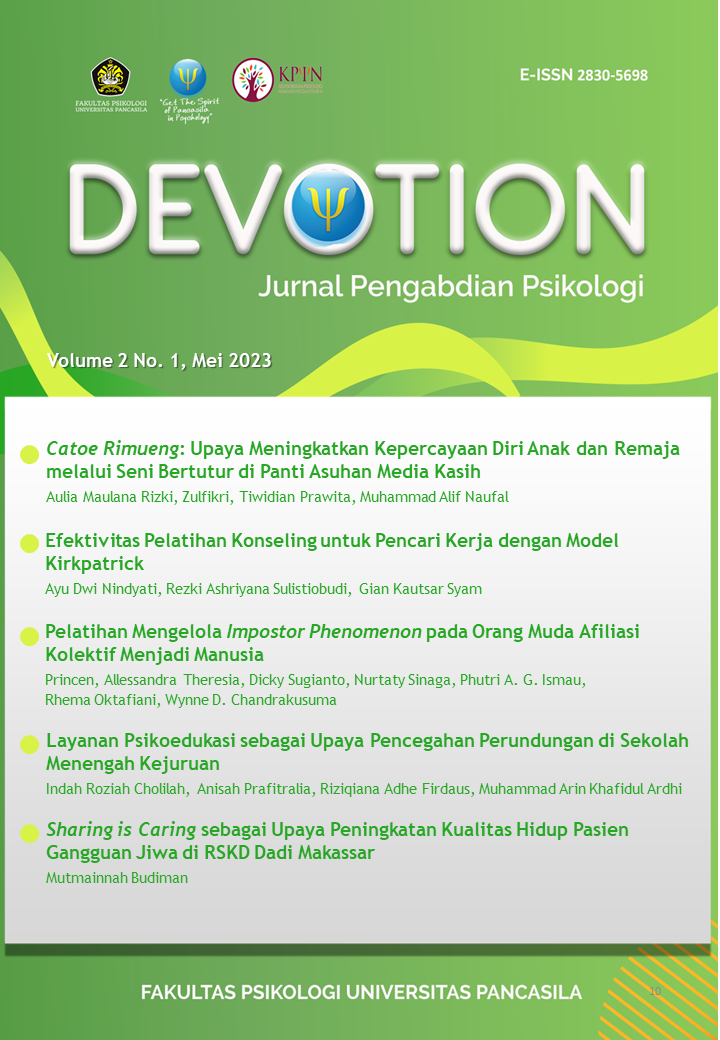Pelatihan Mengelola Impostor Phenomenon pada Orang Muda Afiliasi Kolektif Menjadi Manusia
Abstract
Impostor phenomenon is one of mental health issues which poses risk for an individual, especially in youths. Management of impostor phenomenon within youth is urgent to maintain their mental health. The problem of impostor phenomenon also found in Menjadi Manusia collective affiliated, in which the youth affiliated with this collective was identified experiencing impostor phenomenon. We conducted serial activities within a workshop to help these youth in managing impostor phenomenon. The workshop designed as psychoeducation and psychological intervention to equip the youth in understanding and managing impostor phenomenon. Participants’s feedback about the workshop suggests that it helped them to understand and manage impostor phenomenon. Results of this workshop serve as an initial suggestion on how to manage impostor phenomenon, particularly in Menjadi Manusia collective affiliated.
References
Bravata, D. M., Madhusudhan, D. K., Boroff, M., & Cokley, K. O. (2020). Commentary: Prevalence, predictors, and treatment of imposter syndrome: A systematic review. Journal of Mental Health & Clinical Psychology, 4(3), 12-16. https://doi.org/10.29245/2578-2959/2020/3.1207
Broderick, P. C., & Blewitt, P. (2020). The life span: Human development for helping professionals (5th ed). Pearson.
Campos, I. F. D. S., Camara, G. F., Carneiro, A. G., Kubrusly, M., Peixoto, R. A. C., & Peixoto Junior, A. A. (2022). Impostor Syndrome and its association with depression and burnout among medical students. Revista Brasileira de Educação Médica, 46. https://doi.org/10.1590/1981-5271v46.2-20200491.ING
Mak, K. K., Kleitman, S., & Abbott, M. J. (2019). Impostor phenomenon measurement scales: a systematic review. Frontiers in Psychology, 10, 671. https://doi.org/10.3389/fpsyg.2019.00671
Newman, B. M., Lohman, B. J., & Newman, P. R. (2007). Peer group membership and a sense of belonging: their relationship to adolescent behavior problems. Adolescence, 42(166), 241-263.
Pannhausen, S., Klug, K., & Rohrmann, S. (2020). Never good enough: The relation between the impostor phenomenon and multidimensional perfectionism. Current Psychology, 41, 888–901. https://doi.org/10.1007/s12144-020-00613-7
Pervez, A., Brady, L. L., Mullane, K., Lo, K. D., Bennett, A. A., & Nelson, T. A. (2021). An empirical investigation of mental illness, impostor syndrome, and social support in management doctoral programs. Journal of Management Education, 45(1), 126-158. https://doi.org/ 10.1177/1052562920953195
Ramm, E. R. (2019). Compare with care: the impact of social media on predictors of impostor feelings (Doctoral dissertation, California State University, Sacramento). California State University, Sacramento Digital Archive. https://scholarworks.calstate.edu/downloads/zw12zb58f
Santrock, J. W. (2017). Life span development (17th ed.). McGraw-Hill Education.
Sigelman, C., De George, L., Cunial, K., & Rider, E. A. (2019). Life span human development (3rd ed.). Cengage.
Thomas, M., & Bigatti, S. (2020). Perfectionism, impostor phenomenon, and mental health in medicine: a literature review. International Journal of Medical Education, 11, 201–213. https://doi.org/10.5116/ijme.5f54.c8f8









